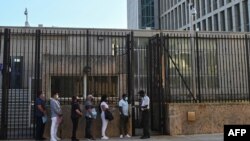The United States and Cuba will hold another round of migration talks on Wednesday, officials said, as the Biden administration braces for the end of COVID-era border restrictions that have blocked Cubans in recent months from crossing into the U.S. from Mexico.
The high-level meeting in Washington will follow one held in Havana in November and comes a year after the Biden administration resumed such conversations after a long hiatus under former President Donald Trump.
The U.S. embassy in Havana resumed full immigrant visa processing and consular services in January for the first time since 2017 in a bid to stem last year's record-breaking flow of migrants from Cuba north to the United States.
This week's meeting "represents a continuation of our long engagement with Cuba on migration matters as neighboring states and is limited to the topic of migration," a U.S. State Department official said on Monday.
"Ensuring safe, orderly, humane, and regular migration between Cuba and the United States remains a primary interest of the United States, consistent with our interest in fostering family reunification, and promoting greater respect for human rights and fundamental freedoms in Cuba," the State Department official said on condition of anonymity.
Cuba's Communist government said it too seeks to encourage legal and orderly migration, but has long blamed the Cold War-era U.S. embargo for strangling the island's economy and encouraging its youth to emigrate.
A record 220,000 Cubans were caught illegally crossing the U.S.-Mexico border in fiscal year 2022, which ended on Sept. 30, part of a broader increase in apprehensions under Democratic U.S. President Joe Biden. Many other Cubans attempted the perilous journey to Florida in rickety boats and rafts.
Under pressure from Republicans and some Democrats, Biden adopted more restrictive border security measures in January, causing the number of Cubans and other migrants caught at the border to plummet.
At the same time, Biden expanded legal pathways into the U.S., allowing up to 30,000 Cubans, Haitians, Nicaraguans and Venezuelans per month to enter legally if they travel by air and have U.S. sponsors.
The U.S. Border Patrol arrested 176 Cubans at the southwest border in February, down from nearly 43,000 in December.
But the Biden administration is preparing for a possible increase in migrants attempting to cross the border with Mexico when COVID border restrictions are set to end on May 11.
The restrictions, known as Title 42, allow U.S. authorities to rapidly expel migrants to Mexico without the chance to seek U.S. asylum.





